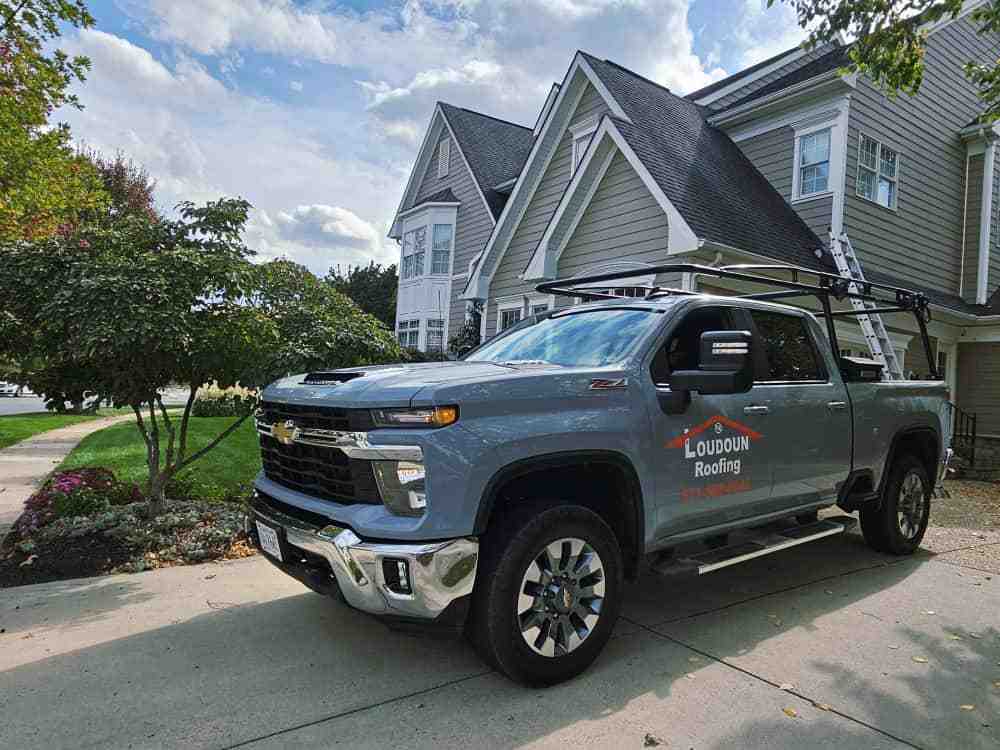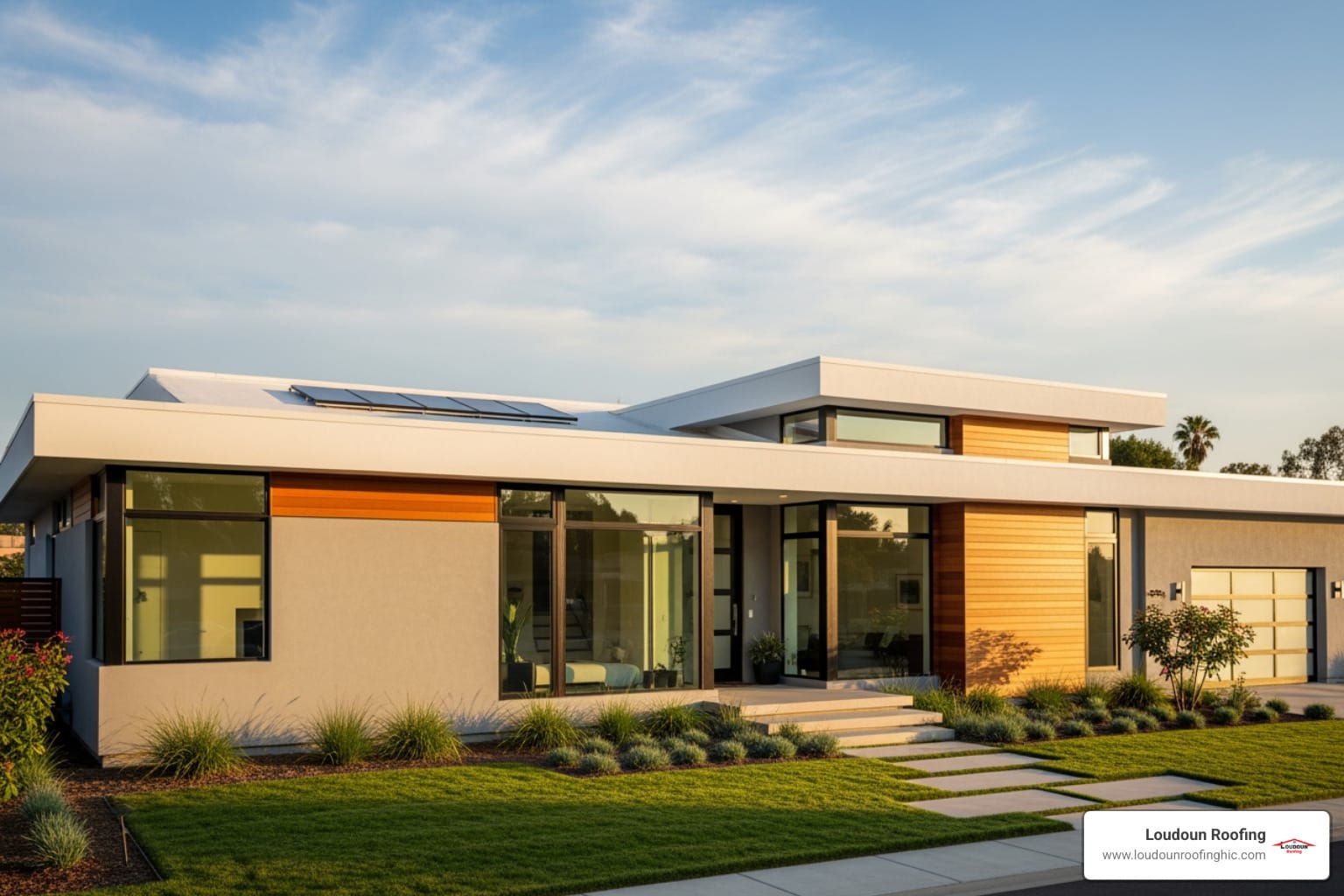Why Every Homeowner Needs to Understand Roof Inspections
A house roof inspection is a systematic evaluation of your entire roofing system designed to identify existing damage and potential problems before they escalate. Understanding this process is crucial for protecting your home’s structural integrity and maintaining its value. As a leading provider of residential and commercial roofing services, we’ve seen how proactive inspections prevent costly emergencies. An inspection covers exterior components like shingles and flashing, interior spaces like the attic, and the underlying roof structure.
Research shows over 85% of homes have roof damage, and 30% of insurance claims stem from leaks, often due to deferred maintenance. A proactive inspection, typically costing $125 to $571, can save you thousands in future repairs. Your roof is your home’s first line of defense, and whether you’re buying, selling, or maintaining, a professional roof inspection is essential. Since 2001, I, Esteban Marin, have helped homeowners across Leesburg and Northern Virginia extend their roof lifespans through regular, thorough inspections.
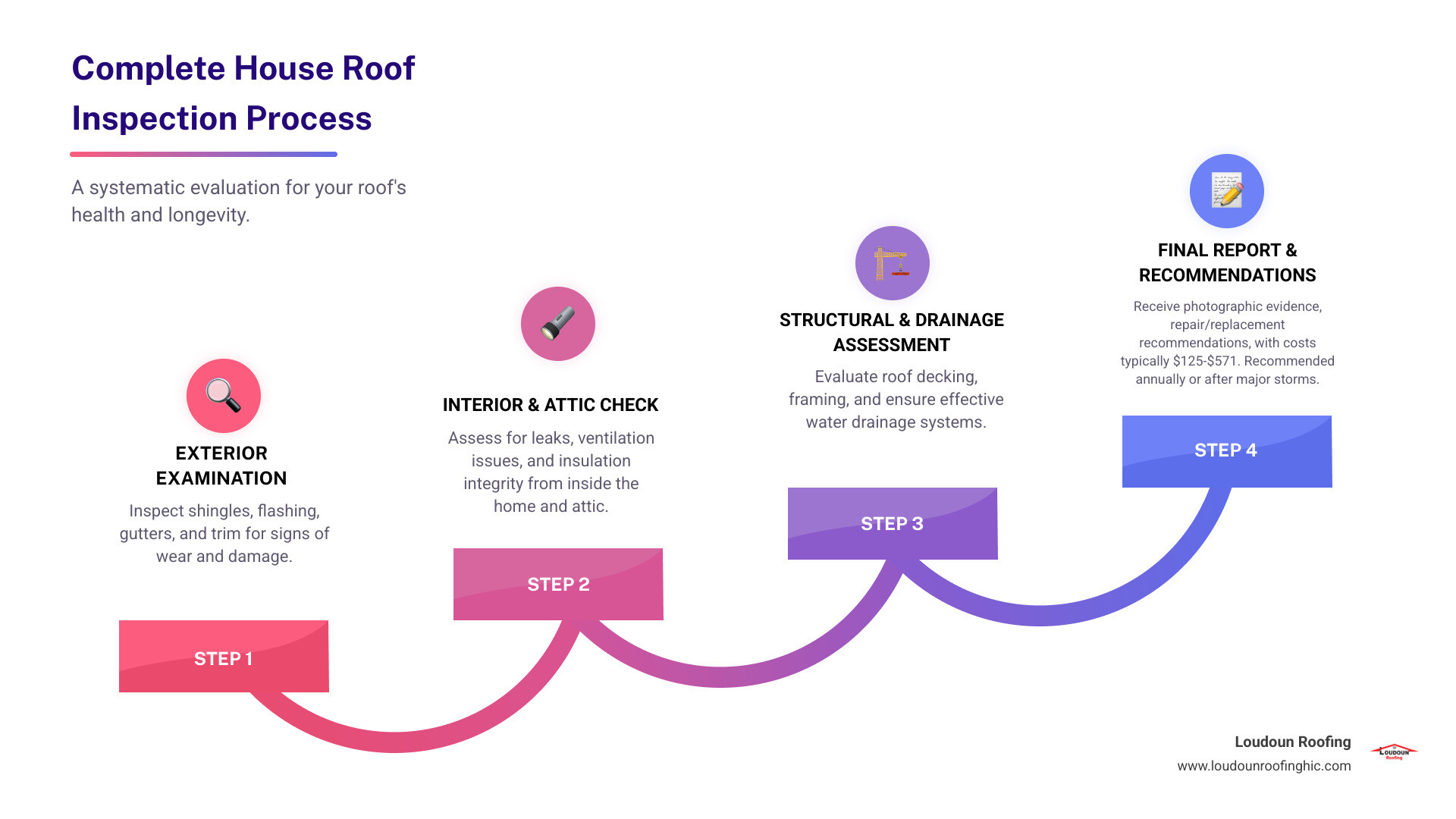
Why a Roof Inspection is Your Home’s Best Defense
A house roof inspection is your home’s best defense against preventable damage. More than 85% of homes are sold with some form of roof damage, and the number one cause of roof issues is simply deferred maintenance. Catching problems early—like a few cracked shingles or minor flashing damage—is the key to cost avoidance. A simple repair costing a few hundred dollars can prevent a catastrophic failure that runs into the tens of thousands for structural rot, mold remediation, and interior reconstruction.
Water damage and leaks are particularly destructive because they often start small and hidden. By the time you see a stain on your ceiling, significant damage to your home’s framing and insulation may have already occurred. Furthermore, a compromised roof hurts your home’s energy efficiency. Damaged insulation and air leaks force your HVAC system to work harder, increasing utility bills.
Regular Roofing Maintenance not only extends your roof’s lifespan but also protects your property value, a powerful selling point. For homeowners in Leesburg and throughout Northern Virginia, our region’s weather makes proactive inspections essential for protecting your most valuable asset.
The Professional House Roof Inspection Process: What to Expect
A professional house roof inspection is a comprehensive, multi-point evaluation of your entire roofing system, inside and out. An inspector assesses not just the shingles but also the underlying structure, drainage, and interior spaces to get a complete picture of your roof’s health. At Loudoun Roofing, our professional roof inspection process is designed to be exhaustive, starting with an interior check for leaks, moving to an exterior examination, and culminating in a hands-on assessment on the roof itself.
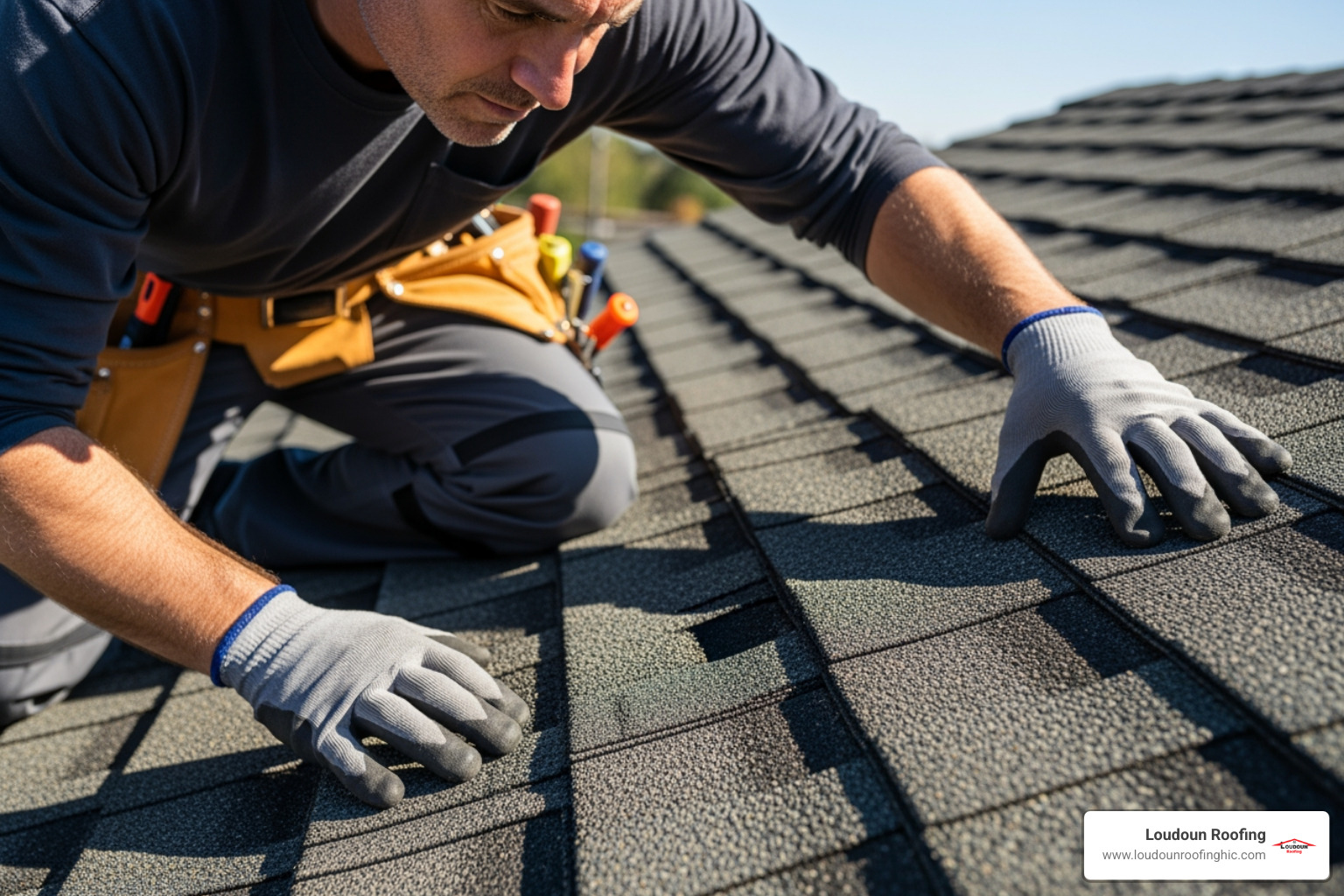
The Exterior Examination
The exterior check is a detailed assessment of your roof’s first line of defense. A trained professional looks for subtle signs of wear and tear that an untrained eye would miss.
- Shingles: We check for blistering, curling, splitting, missing shingles, and excessive granule loss, which indicates your shingles are nearing the end of their life.
- Flashing: As a common failure point, flashing around chimneys, vents, and skylights is inspected for rust, damage, or failed sealant.
- Drainage System: We assess your gutters and downspouts for blockages and proper attachment. Clogged gutters can cause water to damage your foundation and siding, which may require Roof and Gutter Repair.
- Structural Edges: We examine fascia and soffits for rot, holes, or pest damage and ensure the drip edge is correctly installed to direct water away from the fascia. Damage here can be addressed by our Roof and Fascia Repair team.
- Organic Growth: We look for moss and algae, which trap moisture and can lead to rot. You can learn more from this Complete Roof Inspection Checklist.
The Interior & Attic Check
Some of the most critical roofing problems are finded from inside the home. An inspector enters your attic to find early warning signs that aren’t visible from the outside.
- Signs of Leaks: We scan for water stains on ceilings, mold or mildew growth, and any visible daylight penetration through the roof deck, all of which indicate an active leak.
- Structural Integrity: The underside of the roof decking is checked for sagging, which can signal water damage or structural weakness.
- Ventilation & Insulation: Inadequate ventilation traps heat and moisture, damaging your roof from the inside out. We also check for wet insulation, which loses its R-value and points to a leak.
- Pest Damage: We look for signs of rodents or insects that may have compromised wiring, insulation, or wood framing.
If we find a leak, our Roof Leak Repair McLean team can address it promptly to prevent further damage.
The Final Report and Recommendations
Following the inspection, you receive a comprehensive report that translates our findings into a clear action plan. This document includes high-resolution photographs of any problem areas, a detailed explanation of the issues in plain language, and prioritized recommendations. We outline specific, actionable steps for any necessary Roof Repair and provide an honest assessment if a full Roof Replacement is the more cost-effective solution. We review the report with you, answer all your questions, and can provide a Free Roof Estimate for any recommended work, empowering you to make informed decisions to protect your home.
DIY vs. Professional Inspections: A Critical Comparison
While homeowners can spot obvious issues like missing shingles from the ground, a DIY inspection is never a substitute for a professional house roof inspection. Professionals bring training, safety equipment, and experience that an untrained eye cannot match. Attempting to walk on a roof is dangerous and can lead to overlooking critical damage that costs thousands later.
The primary reasons to hire a professional are safety and accuracy. Professionals are trained to work at heights, use safety harnesses, and are fully insured, protecting you from liability. They also use specialized tools like moisture meters and infrared cameras to detect hidden leaks invisible to the naked eye. An expert can differentiate between cosmetic blemishes and serious structural problems, ensuring an accurate diagnosis. For a safe alternative, you can learn How to Conduct a Roof Inspection from the Ground, but it won’t replace a professional’s thoroughness.
| Feature | DIY Inspection | Professional Inspection |
|---|---|---|
| Safety | High risk of falls, injuries; lack of proper gear | Trained, insured, uses safety equipment (harnesses, ladders) |
| Thoroughness | Limited to ground-level view; may miss subtle damage | Comprehensive interior/exterior, attic access, detailed component check |
| Tools/Technology | Binoculars, possibly a ladder (if daring) | Drones, infrared cameras, moisture meters, specialized tools |
| Accuracy | Relies on untrained eye; prone to misdiagnosis | Expert knowledge, experience in identifying complex issues |
| Liability | Homeowner bears all risks of injury or further damage | Inspector is insured, assumes liability for their work |
The bottom line is clear: for a comprehensive, safe, and accurate assessment of your roof’s health, it’s always best to Find a Roofer you can trust in Leesburg, Loudoun County, and Northern Virginia.
Scheduling, Costs, and Hiring a Qualified Inspector
Understanding when to schedule an inspection, what it might cost, and how to hire the right professional are key to effective roof maintenance. These factors ensure you get a quality assessment without overpaying and can trust the results.
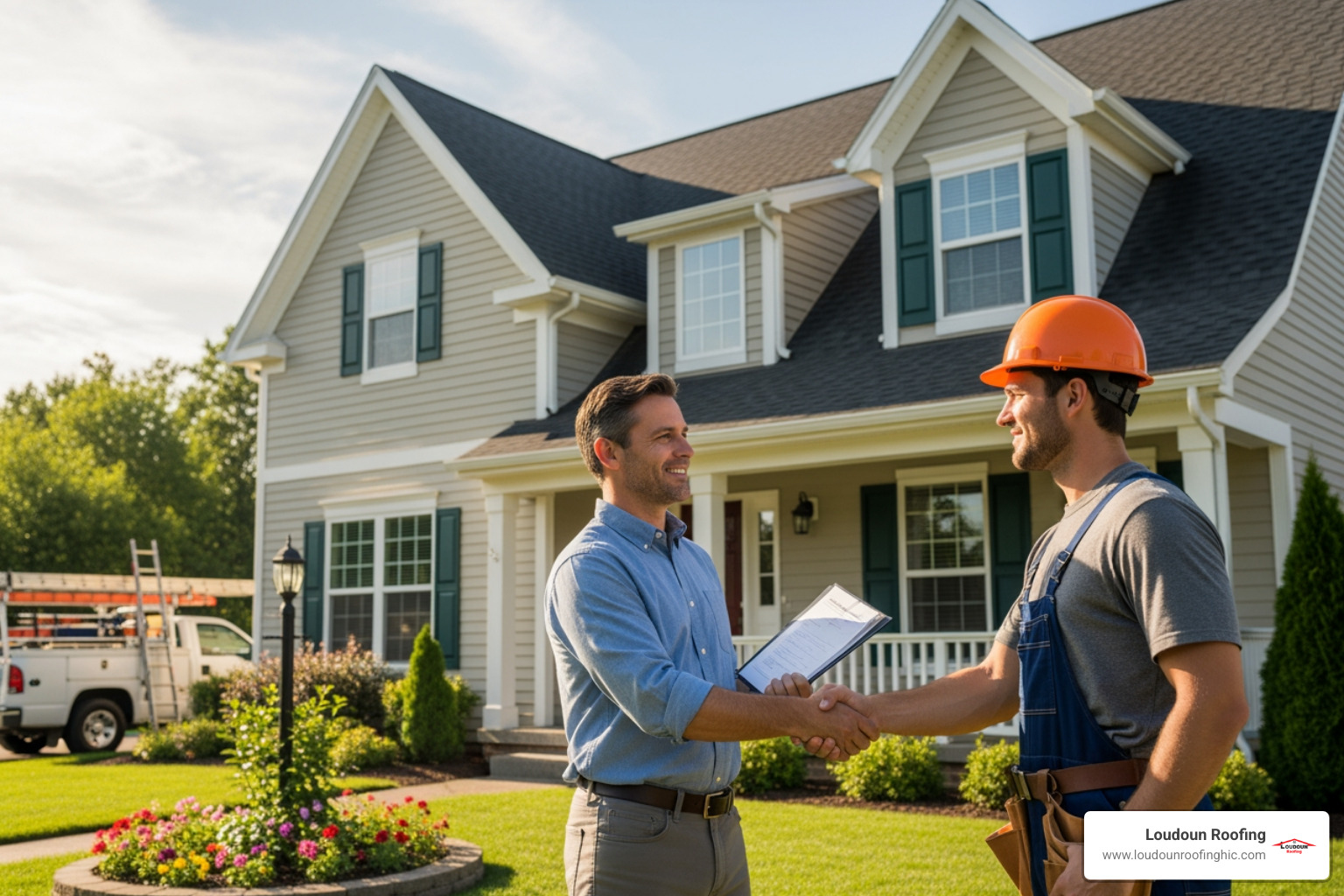
How Often to Schedule a House Roof Inspection
For a detailed guide, see our post on How Often Should You Inspect Your Roof?. As a general rule, schedule a house roof inspection at these key times:
- Annually: A yearly check-up, ideally in the spring or fall, helps catch minor issues before they escalate.
- After Major Storms: High winds, hail, or heavy snow can cause hidden damage. A Storm Damage Assessment is critical after severe weather events.
- For an Aging Roof: If your roof is over 20 years old, twice-yearly inspections are wise. Different materials like Asphalt Shingle Roofs and Metal Roofing have different lifespans.
- When Buying or Selling a Home: An inspection protects buyers from hidden costs and helps sellers justify their asking price.
Understanding the Cost of a House Roof Inspection
A professional house roof inspection typically costs between $125 and $571, with an average of $331. This is a small investment compared to the potential Cost to Tear Off and Replace Roof due to undetected damage. The final price depends on several factors:
- Roof Size and Complexity: Larger or more architecturally complex roofs take more time to inspect.
- Roof Slope: Steep roofs require extra safety equipment and time, increasing the cost.
- Accessibility: Difficult-to-reach roofs may require special equipment.
- Inspection Type: A standard visual inspection is the baseline. More advanced methods like drone ($400 avg.) or infrared ($400-$600) inspections cost more but can reveal hidden issues.
How to Hire a Reputable Inspector in Northern Virginia
Finding a trustworthy inspector in communities like Leesburg or McLean is crucial. Here’s what to look for:
- License and Insurance: Always verify that the contractor is fully licensed and insured to protect yourself.
- Certifications and Local Expertise: Look for industry credentials, like being a GAF-certified contractor, and deep experience with Northern Virginia’s specific weather challenges.
- Reviews and References: Check online reviews and ask for local references to gauge their reputation for quality and honesty.
- Multiple Quotes: Get at least three quotes to compare services and pricing, but be wary of unusually low bids, which can indicate a lack of experience or cut corners.
A reputable company will provide honest findings, which is why we are considered among the Best Roof Replacement Contractors in the region.
Frequently Asked Questions about Roof Inspections
Homeowners often have questions about the specifics of roof inspections, certifications, and insurance coverage. Here are clear answers to some of the most common inquiries.
What is a roof certification and is it different from an inspection?
Yes, they are different. A house roof inspection is a diagnostic report on your roof’s current condition. A roof certification is a formal document issued after an inspection, stating the roof is in good condition and is expected to remain leak-free for a set period (typically 1-5 years). While an inspection identifies problems, a certification provides assurance, which is especially valuable in real estate transactions. For more details, consider a Certified Roof Inspections McLean VA service.
How does a roof inspection differ from a general home inspection?
A general home inspection is a broad overview of the entire house, with only a brief, surface-level look at the roof. A dedicated house roof inspection is a specialized deep dive performed by a roofing expert. The specialist spends more time on the roof and in the attic, using their expertise to identify subtle signs of wear, installation errors, or ventilation issues that a general inspector would likely miss.
Will my insurance cover a roof inspection or repairs?
Insurance policies are designed to cover sudden, accidental damage from “covered perils” like storms or fallen trees—not issues from old age or lack of maintenance.
- Inspections: Your insurer will not pay for routine, preventative inspections. However, an inspection needed to assess damage for a claim is typically part of the claims process.
- Repairs: Insurance will cover repairs for storm damage (minus your deductible) but will deny claims for damage caused by neglect.
Keeping good maintenance records can strengthen your claim. Our experts can help you steer the Roof Insurance Claims Explained process.
Protect Your Home with a Professional Inspection
Your roof is your home’s primary shield against the elements. A regular house roof inspection is the most effective form of preventive medicine for your property, saving you from the stress and expense of an unexpected roofing emergency. Catching a small issue like worn flashing early can prevent thousands of dollars in structural damage down the road.
Beyond the financial savings, a professional inspection delivers invaluable peace of mind. Knowing your roof is sound lets you rest easy during Northern Virginia’s intense storms, confident that your family and investment are secure.
For homeowners throughout Leesburg, McLean, and all of Loudoun County, Loudoun Roofing provides expert inspections by certified professionals. We deliver thorough assessments with detailed reports and honest recommendations. If it’s been over a year since your last inspection, or if you have concerns after a recent storm, don’t wait for a leak to signal a problem.
Schedule your professional Roof Inspection today by calling us at (703) 777-0070 or contacting us online. Let us help you keep your home safe and dry for years to come.


